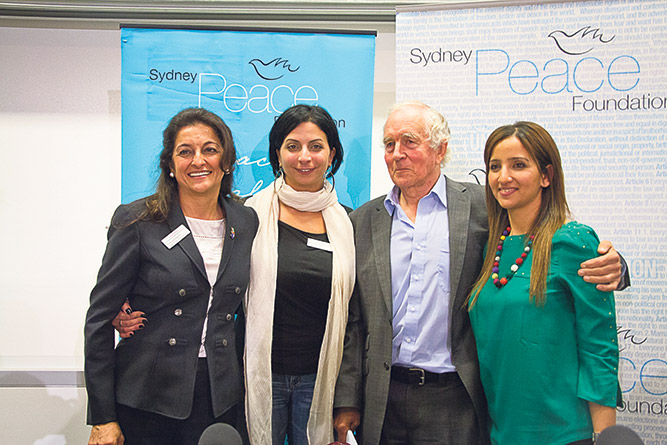Ms Zeina Daccache, a clinical psychologist, drama therapist, actress and filmmaker, was born during the Civil War (1975-1990) in Lebanon, a country that counts 17 official religions. Her Christian family taught her tolerance of other religions (“one of the lucky people raised this way”). After studying drama therapy in the US, she decided to come back to Lebanon (“because I believed something could be done”). She wanted to work with marginalised populations and decided to start with prisons, “the consequences of all our problems”. Despite encountering a lot of rejections initially, she was able to produce a play inside the prison. A documentary retelling the experience, 12 Angry Lebanese, has done the rounds of international festivals.
Moroccan Ms Manal Elattir is the CEO of Social Enterprise for Women’s Economic Empowerment, and founder of the first NGO in Social Entrepreneurship in Morocco. After studying in the US and working with international organisations and development agencies, she thought about how she could create real impact and sustainable development, working with women in rural communities: “Instead of seeing the women as beneficiaries, I saw them as partners. I created a social enterprise. It’s very uncommon as it’s for profit, but to me it’s the most sustainable way. That alone changes everything, because at the end of the day the women want economic independence, and I strongly believe that being economically empowered opens doors to opportunities.”
Dr Houriya al-Kazim hails from the United Arab Emirates. She’s a medical director and consultant breast surgeon. She trained as a surgeon in Ireland, and she knew she wanted to work with breast cancer patients when she came back to Dubai to train as an intern: “I saw really advanced cases of breast cancer, the likes of which I’d never seen … The reason is that there are still a lot of taboos, we don’t say the word ‘cancer’, we don’t say the word ‘breast’, and most women today won’t take off their clothes in front of a male surgeon.” With her NGO, “Brest Friends”, she produces a lot of educational material in many different languages, as UAE nationals only make up 15 per cent of the total population.
The discussion then turned to women’s rights in the Arab world, where violence against women is a big issue. Zeina says that in Lebanon, there is no law to protect women from domestic violence, which ends up with more women ending up in jail for murdering their husbands, because they have no protection.
Manal Elattir says that 68 per cent of Moroccan women are subject to violence, but that women’s movements didn’t wait for the Arab Spring to be active, and in the past 10 years there have been notable changes, for example when women were able to pass on their nationality to their children, the minimal age for marriage was raised to 18 years, and women obtained the right to divorce. “There has been some progress, but it’s not going to be overnight,” says Manal.
She says that the so-called Arab Spring in Morocco made people accountable and empowered people: “But we still very much need a lot of efforts, I think, to me, the so-called Arab Spring is what happens next, it’s more important. There needs to be more media about what happens next than the actual revolution itself.”
The Arab Spring didn’t have much impact on women’s rights in the United Arab Emirates, as unlike the reality in Saudi Arabia, Houriya al-Kazim can drive, go where she wants, say what she wants and doesn’t encounter problems professionally. She said she encountered more sexism when she was studying surgery in the UK.
Even though the UAE leads the rest of the countries in the Arab World on the Global Gender Gap index, it still ranks quite low (“We’re the best of the worst!”). Houriya was surprised at Australia placing 25th, whereas its neighbour New Zealand fared much better in 6th position: “That’s quite considerable. I don’t feel so bad that we’re so far down, maybe we’ll catch up with Australia!”
While Manal thought it was amazing to see the democracy in Australia, she said was shocked in terms of women’s rights in Australia: “I really thought it was more advanced than what it is, especially with the number of women experiencing violence, a very shocking number for Australia.”
The discussion had to be brought to an end, but not without a final message from each woman. Manal underlined the importance for the Western world to understand and respect that a woman wearing the hijab is not automatically oppressed and that it remains her choice to wear it or not, while Houriya said Arab women were not “this kind of scary woman, wearing a niqab, walking 10 paces behind her husband. We haven’t just come out since the so-called Arab Spring”. Zeina closed the discussion by inviting people not to judge according to what they read in the media, but to risk relationships with real women: “What is a problem for you, might not be a problem for her or for them. Let’s open our horizons.”





